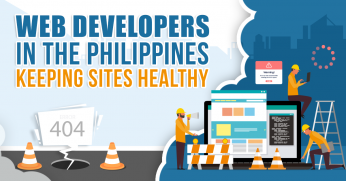
5 Factors That Impact Your Website’s Health and Performance
Most clients refer to a business’ website as their most reliable source of information on the web. For loyal customers, this is true regardless of whether they’re checking to see how they’re adapting their operations to the pandemic or simply browsing through a brand’s products. On the other hand, newer clients take this opportunity to learn more about your business before purchasing anything you’re offering. However, with poor website health, neither of them may be able to navigate your website, causing them to lose interest. Prevent them from clicking away. Read more to learn what factors affect your website’s health and how to keep it at tip-top condition.
Search Engine Optimization (SEO)
Having multiple dead links scattered across your site is one tell-tale sign of poor website health. In fact, nowadays, most search engines understand that users can be frustrated when they frequently encounter broken links. Use tools that help you check around for dead links, missing images, or outdated information and address them accordingly. While you’re at it, review your metadata. Avoid having duplicate title tags, create unique and helpful descriptions, and use the appropriate keywords.
Furthermore, make sure you routinely inspect your backlinks (which occur when other web resources link back to your web pages). This allows you to identify which sites are referencing your content or stuffing them in spam pages. Likewise, avoid writing thin content and doing the same for your blog posts. Instead, provide relevant information for your niche, insightful feedback or comments, and pieces of advice where appropriate.
Source: pexels.com
Speed
In 2020, the average speed indexes for desktop and mobile sites are 4.7 and 11.4 seconds, respectively. However, regardless of how many improvements you’ve made to your website, if it takes longer than 3 seconds to load, Google considers its speed index to be less than optimal. Furthermore, failing to reach this standard may significantly put you at a disadvantage. In fact, users and search engines alike may change their impression of your website based on speed alone. Slow page loading times don’t provide your viewers with the opportunity to see, let alone use, your website in the first place. When Google notices that more and more users are clicking away, they will drop your rankings—making it harder for other prospects to find you. For starters, you can keep your site lightweight by compressing media files, cutting down on external scripts, and maximizing caching across devices for improved website health.
Maintenance
Performing regular maintenance on your website is just as important as displaying a crisp and clean user interface. Get rid of unnecessary themes and plugins. These only act as clutter that consumes space and slows down your website. However, on the flip side, make sure you keep everything else up to date. This includes your PHP version and its modules, your database management system, and the plugins you currently use. In some cases, it may be better to have WordPress automatically update for you. Meanwhile, others prefer to do it manually. Check with your dedicated web developer to see which approach would best suit your needs.
Mobile-Friendly
While you can create personas of your target market, in reality, they may still have varying preferences when it comes to the devices they use. Run your site through tests to determine whether it’s currently mobile-friendly. While the amount of organic traffic you gain from desktop and mobile users vary, both significantly affect your site’s overall health and performance. In reality, you may be surprised how responsive web design (which are pages that adjust to the screen sizes of the devices they’re viewed on) can work wonders.
 Source: pexels.com
Source: pexels.com
Hosting
Work with a web hosting provider you trust to keep your website as healthy and as secure as possible. Furthermore, coordinate a set regular backup schedule for all your site’s contents. This helps you stay prepared in case of any breachers or attacks and allows you to restore your site to its previous state. Moreover, schedule your maintenance periods ahead of time to give your visitors time to prepare for your downtime. The frequency of unscheduled downtime may also affect your site’s health. In the event that you find your website down more often than necessary, it’s best that you consult your hosting provider to check on your hosting plan. It may be time to upgrade to one that can accommodate more site traffic.
Regularly Inspect and Monitor Your Website’s Health
If you haven’t already done so, make sure you include maintaining your website’s health in your list of priorities. Follow best practices for acquiring the best rankings across multiple search engines. Optimize your site to load as fast as possible. Monitor its performance from its back end. Keep it responsive across all kinds of devices. And above all else, make it a point to minimize the amounts of both scheduled and unscheduled downtime.
















Comment 0